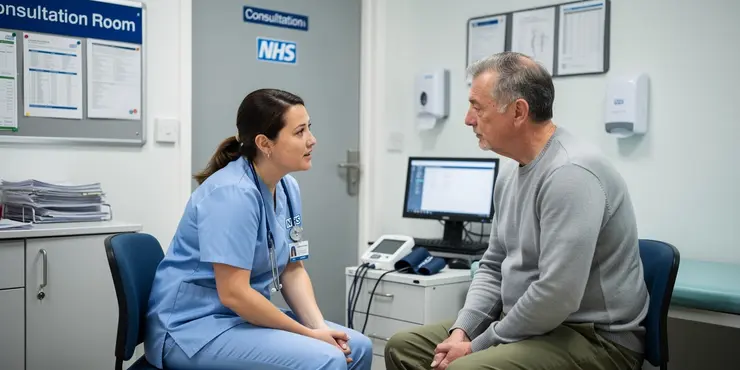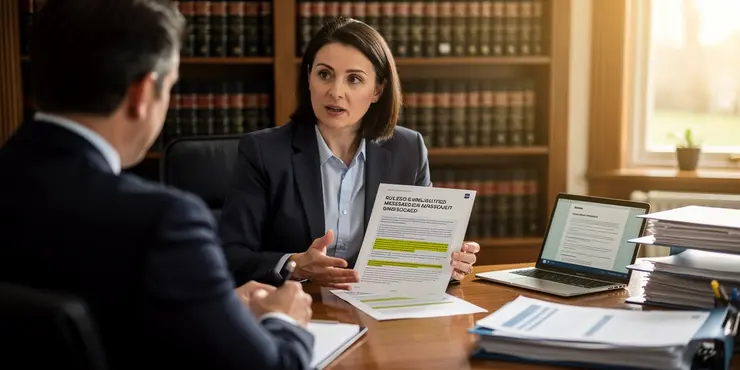
Find Help
More Items From Ergsy search
-

Why does my email appear to be sending spam?
Relevance: 100%
-

Don't Click On That Email (SPAM & SCAMS)
Relevance: 75%
-

Is there a difference between spam and unsolicited messages?
Relevance: 60%
-

Why am I not receiving expected emails?
Relevance: 52%
-

Can unexpected calendar events be a sign of a hacked email?
Relevance: 50%
-

What are some signs that my email might be hacked?
Relevance: 50%
-

What signs indicate that my email filters may have been tampered with?
Relevance: 49%
-

How do I know if my email has been hacked?
Relevance: 49%
-

Are unsolicited emails about weight loss drugs a warning sign?
Relevance: 48%
-

What is the risk of my contacts being compromised if my email is hacked?
Relevance: 47%
-

How can I recover a hacked email account?
Relevance: 38%
-

Is there a specific organization for complaints about unsolicited communications?
Relevance: 38%
-

Can antivirus software protect my email from being hacked?
Relevance: 37%
-

Will HMRC contact me via phone or email regarding my tax refund?
Relevance: 35%
-

What are SEND children?
Relevance: 35%
-

What signs indicate that my social media account might be hacked?
Relevance: 35%
-

Who are SEND children?
Relevance: 35%
-

Are there any penalties for sending unsolicited messages?
Relevance: 34%
-

What does SEND stand for?
Relevance: 34%
-

How are parents involved in the SEND process?
Relevance: 34%
-

Can I send money to an inmate?
Relevance: 33%
-

Why are emails often targeted in data breaches?
Relevance: 33%
-

Are there specific laws governing SEND in schools?
Relevance: 32%
-

Who is responsible for assessing SEND needs?
Relevance: 32%
-

Can I get updates on my immigration status via email?
Relevance: 32%
-

What should I do if I notice unfamiliar emails in my sent folder?
Relevance: 32%
-

How is progress measured for SEND children?
Relevance: 32%
-

What are some common misconceptions about SEND?
Relevance: 32%
-

Can SEND status change over time?
Relevance: 32%
-

What support is available for SEND children in schools?
Relevance: 31%
-

Do SEND children attend mainstream schools?
Relevance: 31%
-

What should I do if I suspect my email has been compromised through phishing?
Relevance: 31%
-

What should I do if I can't access my email account?
Relevance: 31%
-

Can SEND children access extracurricular activities?
Relevance: 31%
-

What are some common types of SEND?
Relevance: 30%
-

How do funding and resources affect SEND support?
Relevance: 30%
-

Why am I receiving password reset emails I didn't request?
Relevance: 30%
-

What does it mean if my friends receive spammy messages from my account?
Relevance: 30%
-

How do I send books or magazines?
Relevance: 30%
-

What items can I send to someone in prison?
Relevance: 30%
Introduction to Email Spam Issues
In today's digital age, email is a crucial communication tool for personal and professional purposes. However, it can be quite alarming to discover that your email account is sending spam messages without your knowledge. Understanding why this happens and how to prevent it is essential for maintaining your online security and reputation.
Reasons Your Email Might Be Sending Spam
There are several reasons why your email might appear to be sending spam. One common cause is that your email account has been compromised. Cybercriminals can gain access to your email through phishing scams or by exploiting weak passwords. Once they have access, they can use your account to send spam emails to your contacts.
Another possibility is that your computer or device has been infected with malware. Some types of malware can take control of your email client and send spam messages on your behalf. Additionally, if your email address has been spoofed, spammers may be using your email address as the "From" address to disguise their spam, even if your account hasn't been compromised.
Consequences of Email Spam
The consequences of your email account sending spam can be severe. Your email provider may temporarily suspend your account or even blacklist it, preventing you from sending legitimate emails. Your contacts might also become wary of opening messages from you, which can damage personal and professional relationships.
Moreover, if your account has been compromised, sensitive information might be at risk. Cybercriminals may have access to personal data, financial information, or other confidential details stored in your email.
How to Prevent and Address Spam Issues
To prevent your email from sending spam, it’s crucial to enhance your security measures. Start by using a strong, unique password and change it regularly. Enable two-factor authentication (2FA) for an additional layer of security. Regularly update your software and run anti-virus scans to protect against malware infections.
If you suspect your account has been compromised, immediately change your password and notify your contacts not to open any suspicious emails from you. Check your email account settings for any unauthorized changes, such as forwarding rules that you didn’t create. Contact your email provider for assistance and consider running a complete security check on your device.
Conclusion
Discovering that your email is sending spam can be stressful, but by understanding the potential causes and taking proactive steps, you can protect yourself and your contacts. Regularly monitoring your account activity and enhancing your security practices will help prevent further issues and maintain your digital integrity.
Introduction to Email Spam Problems
Today, we use email a lot to talk to people, both for fun and work. But sometimes, your email might send bad messages, called spam, without you knowing. It is important to know why this happens and how to stop it to keep your online safety and good name.
Why Your Email Might Be Sending Spam
Your email might send spam for different reasons. One reason is that bad people might have broken into your email. They do this by tricking you into giving them your password or because your password is too simple. When they get in, they can send spam to the people you know.
Another reason is that your computer might have a virus. Some viruses can send spam from your email. Also, a spammer might pretend to be you by using your email address, even if they haven't broken into your account.
What Happens When Your Email Sends Spam
If your email sends spam, bad things can happen. Your email company might stop you from sending messages until you fix the problem. People might not want to open your emails anymore, which can hurt your friendships or work relationships.
If bad people get into your account, they might steal important information like your personal details or money information.
How to Stop Spam Problems
To stop your email from sending spam, make sure your account is safe. Use a strong password that no one else has and change it often. Use something called two-factor authentication (2FA) for extra safety. Make sure your computer's software is up to date and check for viruses often.
If you think someone has broken into your account, change your password right away and tell your friends not to open strange emails from you. Look at your email settings to make sure nothing has changed without your knowledge. Ask your email provider for help and check your device for any problems.
Conclusion
It can be scary if your email sends spam, but if you know why it happens and how to stop it, you can protect yourself and your friends. Watch your account often and keep your safety steps strong to avoid more problems and keep your online world safe.
Frequently Asked Questions
Why is my email sending spam without my knowledge?
Your email account may have been compromised by hackers who are using it to send spam.
How can my email account be hacked to send spam?
Hackers can gain access to your email account through phishing attacks or weak passwords.
What should I do if my email is sending spam?
Immediately change your password and enable two-factor authentication if available.
Can a virus cause my email to send spam?
Yes, malware on your computer can hijack your email client and send spam.
How can I tell if my email is sending spam?
You may notice undelivered mail returns or contacts informing you of strange emails from your address.
How can I prevent my email from sending spam in the future?
Use strong, unique passwords, enable two-factor authentication, and regularly check for suspicious activity.
How do I recover my account if it has been hacked?
Follow your email service's account recovery process to reset your password and secure your account.
Can I be blacklisted if my email sends spam?
Yes, your email address or domain can be blacklisted, making it harder to deliver legitimate emails.
Should I inform my contacts if my email was hacked?
Yes, let them know to avoid clicking on suspicious links or emails coming from your address.
How does a strong password help prevent my email from sending spam?
A strong password is harder for hackers to guess or crack, protecting your account from unauthorized access.
What is two-factor authentication and how does it help?
Two-factor authentication adds an extra layer of security, requiring a second form of verification to access your account.
What types of malware can cause my email to send spam?
Keyloggers, remote access Trojans, and botnets can all compromise your email and send spam.
Can phishing emails lead to my email sending spam?
Yes, if you fall for phishing attempts, attackers can gain your login credentials and misuse your account.
Should I scan my computer if my email is sending spam?
Yes, use antivirus software to scan for malware that may be causing the issue.
Can outdated software contribute to my email being compromised?
Yes, outdated software can have vulnerabilities that attackers exploit to gain access to your system.
How often should I change my email password?
It's recommended to change your password every few months or immediately if you suspect a breach.
Can I use the same password across different accounts?
It's not safe to use the same password across multiple accounts because if one is compromised, others are at risk.
How can spam emails affect my email reputation?
Spam emails can lead to your emails being marked as spam, reducing the likelihood of them reaching recipients' inboxes.
What is a botnet and how can it affect my email?
A botnet is a network of infected devices controlled by an attacker, which can use your email to send spam without your knowledge.
Should I report spam emails sent from my account?
Yes, report the issue to your email provider to help them take appropriate action to secure your account.
Why is my email sending bad messages without me knowing?
Your email might send bad messages if someone else takes over your account. This is called hacking.
Here are some tips to keep your email safe:
- Use a strong password. Make it hard to guess. Use letters, numbers, and symbols.
- Don't share your password with anyone.
- Turn on two-step verification if your email lets you. This adds extra security.
- Tell an adult if you see anything strange with your email.
Ask a trusted adult for help if you are worried about your email.
Bad people might have gotten into your email. They could be using it to send lots of junk messages.
How can someone hack my email to send spam?
People who hack, called hackers, can break into your email. They might send unwanted emails, called spam, from your account.
Here are tools and tips to help keep your email safe:
- Use a strong password with numbers and symbols. Make it hard to guess.
- Don't share your password with anyone.
- Turn on two-step verification if your email offers it. This means you get a code on your phone to log in.
- Be careful where you click. Don't open links or attachments from people you don't know.
- Use security software on your devices to protect against viruses.
Ask an adult or a friend for help if you need to do these things.
Bad people called hackers can get into your email account. They do this by tricking you with fake messages or using easy passwords.
What to Do If Your Email Sends Spam
If your email is sending spam, follow these easy steps:
- Change your email password. Use a strong one with letters and numbers.
- Check your computer for viruses. Ask an adult if you need help.
- Tell your email provider, like Gmail or Yahoo, about the problem.
- Use antivirus software to keep your computer safe.
Ask a trusted adult to help if you find it tricky.
Change your password right away. If you can, turn on something called "two-factor authentication" for extra safety.
Can a computer bug make my email send junk mail?
Yes, bad software on your computer can take over your email and send lots of unwanted messages.
Is my email sending spam? How to check:
Spam is unwanted or junk email. It can be annoying or harmful. Here’s how you can find out if your email is sending spam:
- Check your 'Sent' folder. Are there emails you did not send?
- Did you get messages from others saying you sent them strange emails?
- Change your password if you think someone else is using your email.
- Use antivirus software. It helps keep your computer safe.
If you need help, ask a trusted friend or use online guides. They can help you find out more.
You might see some of your emails come back to you. Or, friends might tell you about weird emails from your address.
How can I stop my email from sending spam?
Make strong passwords that no one else knows. Use different passwords for each account. Turn on extra security steps, like two-factor authentication. This means you need two ways to prove who you are. Check often to see if anything looks strange or wrong on your accounts.
What do I do if someone hacks my account?
If someone breaks into your account, follow these steps to fix it:
- Change your password: Pick a new password that is hard to guess. Use a mix of letters, numbers, and symbols.
- Check your email: Look for emails from your account provider for help or warnings.
- Secure your email: Change your email password too, especially if it is the same as your old account password.
- Update security questions: Change the answers to your security questions if your account uses them.
- Use two-factor authentication: Turn on extra security, like sending a code to your phone.
- Contact support: Reach out to customer support if you need more help.
Ask a trusted adult for help if you are unsure. You can also use tools like a password manager to keep your passwords safe.
If you forgot your password, you can get it back. Follow the steps from your email service to reset it. This will help you keep your account safe.
Can I get in trouble if my email sends bad messages?
Yes, your email address or the name it comes from can be put on a "bad list." This makes it harder to send good emails to people.
Should I tell my friends if someone hacked my email?
If someone breaks into your email, it's a good idea to tell your friends or people you email. They might get strange messages from your account. You can say, "Someone hacked my email. Please don't open links or attachments from my messages."
Here are some tips to help:
- Change your email password to something new and strong.
- Use tools like antivirus software to check your computer for any bad programs.
- Think about using two-step verification for extra security. This means you need a code sent to your phone to log in.
Tell your friends so they stay safe too!
Yes, tell them not to click on strange links or emails that look like they are from you.
How does a strong password stop my email from sending spam?
A strong password keeps your email safe. It stops bad people from getting in.
When your password is strong, it's hard for others to guess it. This stops them from using your email to send fake messages, called spam.
Tips for a strong password:
- Use both big and small letters.
- Add numbers.
- Include special characters, like ! or @.
- Make it long, like 8 or more letters.
Helpful tools:
- Use a password manager to remember your passwords.
- Try a passphrase, a funny sentence you can remember.
A strong password is one that is hard for bad people to guess. It helps keep your account safe.
What is two-factor authentication and how does it help?
Two-factor authentication is a way to keep your online accounts safe.
It means you need two things to log in:
- Something you know (like a password).
- Something you have (like your phone for a code).
This makes it harder for people to get into your account.
If you need help, you can:
- Ask someone you trust.
- Use online videos or guides.
Two-factor authentication helps keep your accounts safe. It means you need to do one more thing before you can get into your account.
What bad software can make my email send junk messages?
Bad programs, like keyloggers, remote access Trojans, and botnets, can sneak into your email and send lots of unwanted messages.
Can bad emails make my email send junk?
Bad emails, called phishing emails, can trick you. If you click on them, they might make your email send junk messages, called spam. Here’s how to stay safe:
- Don't open emails from people you don't know.
- Use a spam filter to catch bad emails.
- Ask someone you trust if you're not sure.
Yes, if you click on bad links, bad people can get your password and use your account.
What to Do if My Email is Sending Spam
Is your email sending bad messages? You might need to check your computer.
Here is what you can do:
- Use an antivirus program. It can check for bad software.
- Ask someone you trust for help.
- Keep your computer programs updated.
This can help keep your email safe.
Yes, use antivirus software. It checks your computer for bad programs that might be causing problems.
Can old software make my email unsafe?
Using old software can sometimes make your email easy for bad people to get into. It is important to let your software update when it needs to. Updates help keep your email safe.
- Tip: Always click "update" when your computer or phone asks you to.
- Tool: Turn on "automatic updates" in your settings to stay safe.
Yes, old software can have weak spots that bad people use to get into your computer.
How often should I change my email password?
You should change your email password every few months. This keeps your email safe.
Here is a tip: Use a mix of letters, numbers, and symbols in your password.
You can use a password manager to help you remember your passwords. A password manager is a tool that keeps all your passwords safe in one place.
You should change your password every few months. Change it right away if you think someone else knows it.
Is it OK to use the same password for different accounts?
No, it's not safe to use the same password for different accounts.
If one account gets hacked, all your accounts could be at risk.
It's better to use a different password for each account.
You can use a password manager to help remember your passwords.
Using the same password for different accounts is not safe. If someone finds out one of your passwords, they can get into your other accounts too.
How do junk emails hurt my email reputation?
Spam emails are bad. They can make your emails go to the spam folder and not the main inbox. This means people might not see your emails.
What is a botnet and how can it affect my email?
A botnet is a group of computers that work together. They can send lots of emails.
Bad people use botnets to send spam or steal information.
A botnet can send unwanted emails from your computer.
To protect your email, use a strong password and update your computer.
A botnet is a group of computers that have been taken over by someone bad. They use these computers to do things like sending lots of annoying emails called spam. You might not even know when this happens.
Here are some ways to stay safe:
- Use antivirus software to protect your computer.
- Be careful when opening emails from people you don't know.
- Keep your computer software up to date.
What should I do if my email sends spam?
Is your email sending junk messages to people? Here is what you can do:
- Tell someone you trust, like a parent or friend.
- Change your email password to make it strong.
- Look for help online or from your email provider.
- Use a tool like spellchecker or read-out-loud software to help you.
Yes, tell your email provider about the problem. They can help fix it and keep your account safe.
Useful Links
This website offers general information and is not a substitute for professional advice.
Always seek guidance from qualified professionals.
If you have any medical concerns or need urgent help, contact a healthcare professional or emergency services immediately.
Some of this content was generated with AI assistance. We’ve done our best to keep it accurate, helpful, and human-friendly.
- Ergsy carfully checks the information in the videos we provide here.
- Videos shown by Youtube after a video has completed, have NOT been reviewed by ERGSY.
- To view, click the arrow in centre of video.
- Most of the videos you find here will have subtitles and/or closed captions available.
- You may need to turn these on, and choose your preferred language.
- Go to the video you'd like to watch.
- If closed captions (CC) are available, settings will be visible on the bottom right of the video player.
- To turn on Captions, click settings .
- To turn off Captions, click settings again.
More Items From Ergsy search
-

Why does my email appear to be sending spam?
Relevance: 100%
-

Don't Click On That Email (SPAM & SCAMS)
Relevance: 75%
-

Is there a difference between spam and unsolicited messages?
Relevance: 60%
-

Why am I not receiving expected emails?
Relevance: 52%
-

Can unexpected calendar events be a sign of a hacked email?
Relevance: 50%
-

What are some signs that my email might be hacked?
Relevance: 50%
-

What signs indicate that my email filters may have been tampered with?
Relevance: 49%
-

How do I know if my email has been hacked?
Relevance: 49%
-

Are unsolicited emails about weight loss drugs a warning sign?
Relevance: 48%
-

What is the risk of my contacts being compromised if my email is hacked?
Relevance: 47%
-

How can I recover a hacked email account?
Relevance: 38%
-

Is there a specific organization for complaints about unsolicited communications?
Relevance: 38%
-

Can antivirus software protect my email from being hacked?
Relevance: 37%
-

Will HMRC contact me via phone or email regarding my tax refund?
Relevance: 35%
-

What are SEND children?
Relevance: 35%
-

What signs indicate that my social media account might be hacked?
Relevance: 35%
-

Who are SEND children?
Relevance: 35%
-

Are there any penalties for sending unsolicited messages?
Relevance: 34%
-

What does SEND stand for?
Relevance: 34%
-

How are parents involved in the SEND process?
Relevance: 34%
-

Can I send money to an inmate?
Relevance: 33%
-

Why are emails often targeted in data breaches?
Relevance: 33%
-

Are there specific laws governing SEND in schools?
Relevance: 32%
-

Who is responsible for assessing SEND needs?
Relevance: 32%
-

Can I get updates on my immigration status via email?
Relevance: 32%
-

What should I do if I notice unfamiliar emails in my sent folder?
Relevance: 32%
-

How is progress measured for SEND children?
Relevance: 32%
-

What are some common misconceptions about SEND?
Relevance: 32%
-

Can SEND status change over time?
Relevance: 32%
-

What support is available for SEND children in schools?
Relevance: 31%
-

Do SEND children attend mainstream schools?
Relevance: 31%
-

What should I do if I suspect my email has been compromised through phishing?
Relevance: 31%
-

What should I do if I can't access my email account?
Relevance: 31%
-

Can SEND children access extracurricular activities?
Relevance: 31%
-

What are some common types of SEND?
Relevance: 30%
-

How do funding and resources affect SEND support?
Relevance: 30%
-

Why am I receiving password reset emails I didn't request?
Relevance: 30%
-

What does it mean if my friends receive spammy messages from my account?
Relevance: 30%
-

How do I send books or magazines?
Relevance: 30%
-

What items can I send to someone in prison?
Relevance: 30%


